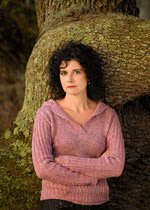My third book, Effigies
Seriously, though, I've been thrilled with how well Mississippians have taken to my books. My heroine, Faye, is multiracial, and there is that possibility that lingering problems related to the civil rights era could make people less receptive to stories that deal with racial friction and history. My mother is an avid supporter of my work. (If there is anyone in Hattiesburg, Mississippi, who does not know about my books, it is not my mother's fault.) Think about it. Her friends include people in their 80s, people who were adults in the 1960s and remember that troubled period well. And think about this--because Faye is multiracial, she can't have a date that isn't interracial, and these people remember when that was illegal.
It warms my heart and restores my faith in mankind to be able to tell you that I've not had the first discouraging word about the stories I choose to write. I have been warmly embraced by people of all ages and races, all over the state. Effigies
So what's the book about and where did I get the idea? Well, I decided I wanted to do Mississippi, and I didn't want to do my hometown, because university towns are much the same, wherever you go. So I started my "reading for a living" process, crawling all over the internet for facts and fables and tenuous ideas.
I kept finding myself reading about Neshoba County. It is the home of the Neshoba County Fair, an extravaganza so unique that it is difficult to communicate the scope of it. The population of Neshoba County mutates upward by about 25,000 people for a week in July. It is a residential fair, in that a community of cabins that are occupied only during that week exists on the fairgrounds. These not-too-palatial dwellings have changed hands for huge sums of money, because everybody who is anybody in Neshoba County sleeps on the fairgrounds during the fair. Families have split over who got Grandma's cabin.
There is something for everybody at the fair. Rides and fair food and livestock, yes. But also horse racing. The Miss Neshoba County Pageant. And good Lord, there are political speeches. Everybody who aspires to public office in Mississippi goes to the fair. The fair's timing is consulted before primaries are scheduled. Ronald Reagan announced his candidacy for the presidency there. It is a big hairy deal.
Neshoba County is also the ancestral home of the Choctaw Nation, the first Native American tribe to be removed to the Indian Territory. Some refused to go, and that remnant remains here, where they built Nanih Waiya, the Mother Mound of the Choctaw, some 2000 years ago. In the 1960s, the Choctaws were called by Time Magazine "the poorest pocket in the poorest state in the union." Since then, they elected progressive tribal leadership who brought in any company that promised a job. They make greeting cards. They make little wire harnesses that go somewhere in the engines of GM cars. And, eventually, they built a casino. And another casino. And a golf resort for people who don't like to gamble. And a water park where kids can play while their parents gamble. The Choctaws are now among the top employers in the state of Mississippi. What a story...
And many people remember that Neshoba County was the home of one of the most notorious hate crimes of the 1960s, the murder of three civil rights workers whose bodies were later found buried in a dam.
I looked at all this information and I thought, "If I can't get a story out of all this, then I am not a writer."
I am a writer, and Effigies went on to win a bronze medal from the Florida Book Awards, among other nice recognitions. But my proudest moment came when I learned that the Mississippi Band of Choctaw Indians had bought a copy for every student in their high school, and that they wanted me to come speak to their teachers about how to use it in the classroom.
That was a career highlight. You can't anticipate moments like that...but sometimes they come to you. I'm grateful.
Mary Anna















No comments:
Post a Comment